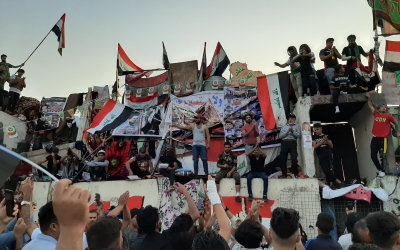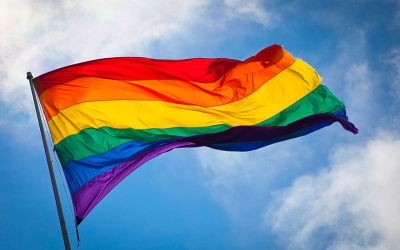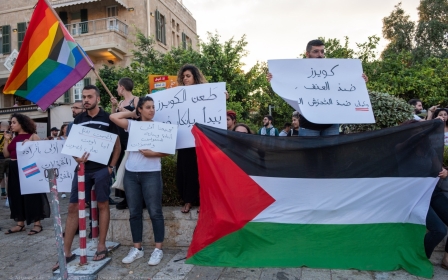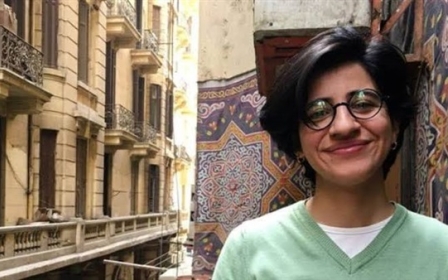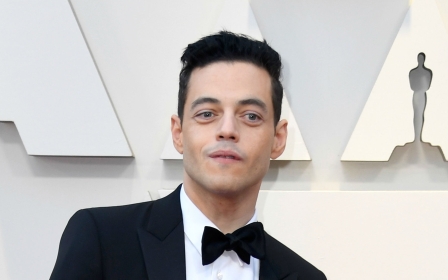LGBTQ activists in Iraq will 'not hesitate' to keep on protesting despite threats
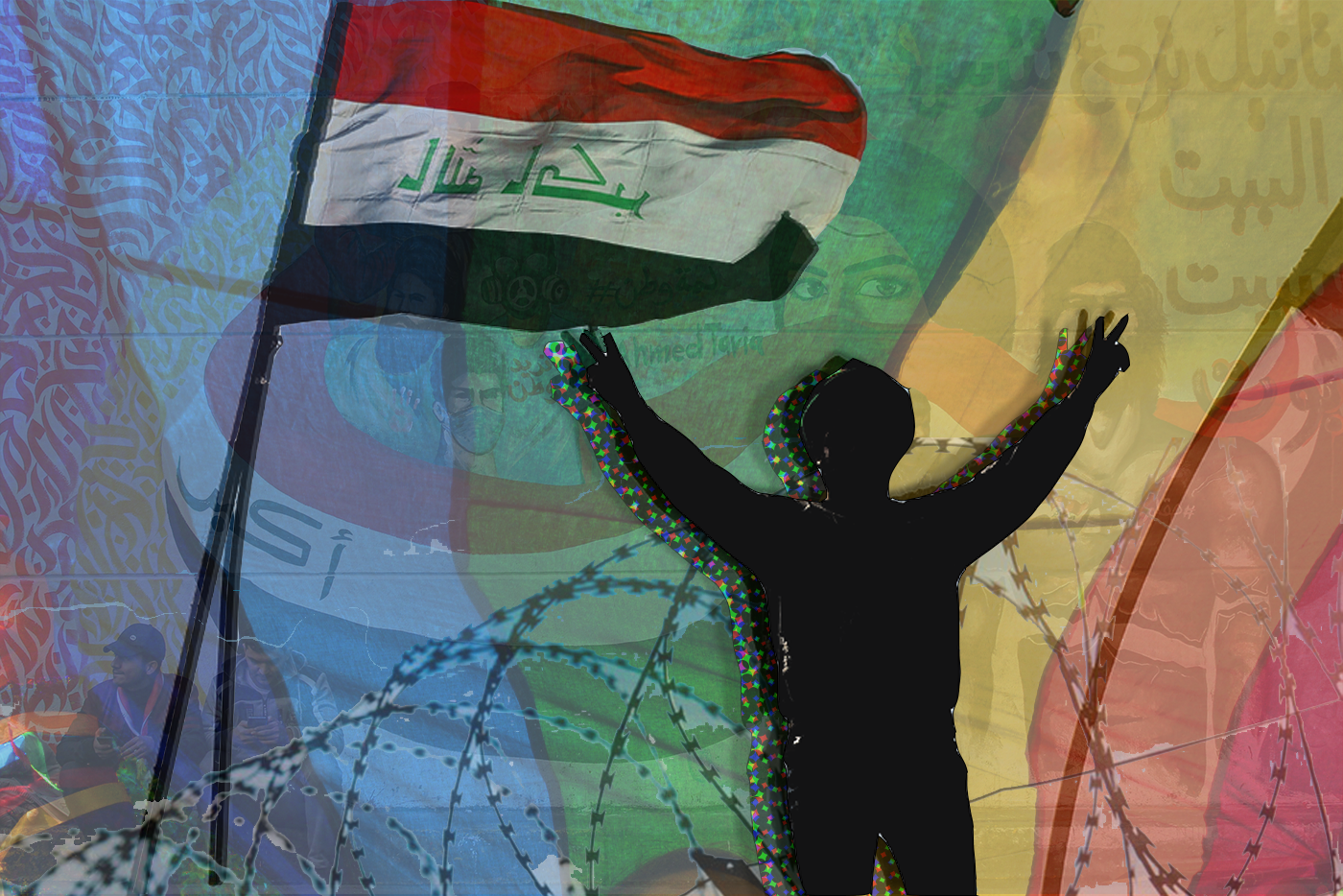
"Most of my friends in the protests are gay, but no one reveals their sexual identity," said Malak, a lesbian student at the Arts College in Baghdad.
While homosexuality is not illegal in Iraq, few would deny that LGBTQ individuals as a whole have long faced widespread discrimination and remain largely invisible in what is still a mostly conservative society.
LGBTQ people in the country have for years faced the threat of violence, with many murders taking place at the hands of armed groups that face little to no accountability.
'Our demands are simple: to just live safely in our country without being subjected to physical and psychological abuse, and without being dealt with as outcasts, even by our families'
- Malak, Arts College of Baghdad
Anti-government demonstrations that first broke out exactly a year ago on Thursday united thousands of Iraqis in denouncing a lack of services, corrupt political class and foreign interference.
For some of the young people involved, the protests were also about challenging long-established social norms, a factor which led some LGBTQ Iraqis to play a more prominent role in the demonstrations.
New MEE newsletter: Jerusalem Dispatch
Sign up to get the latest insights and analysis on Israel-Palestine, alongside Turkey Unpacked and other MEE newsletters
Inside a tent near the protest epicentre of Tahrir Square in Baghdad, Malak and six other young protesters hung empty tear gas canisters fired at them by the security forces like necklaces around their necks.
Since the beginning of the demonstrations, hundreds of activists have been killed by security forces and other armed groups.
"I had announced my sexual identity among my friends in Tahrir Square and demanded they speak about LGBT rights during the protests," Malak said.
"This caused me problems, including threats by militias... so I left the protests for several days, but I returned to Tahrir Square because there was no safe place for me.
"Even if there was a law that supported us, society would remain a major obstacle - stuck on customs based on male domination and tribal custom," she added.
"Our demands are simple: to just live safely in our country without being subjected to physical and psychological abuse, and without being dealt with as outcasts, even by our families."
History of violence
Violence against LGBTQ people in Iraq has a long history. Under the government of former President Saddam Hussein, members of the Saddam Fedayeen loyalist militia - led by Hussein's notoriously violent son Uday - would torture and kill men believed to be gay.
Following Hussein's overthrow by the US-led coalition in 2003, numerous armed groups sprung up across Iraq, some backed by Iran. Many have launched campaigns against homosexuality, and in at least one instance, in 2014, Asaib Ahl al-Haq militia released a wanted list with the names of men they claimed to be homosexual.
Islamic State (IS), which seized control of much of Iraq in 2014, also became notorious for their public executions of allegedly gay men.
Amir Ashour, executive director of gay rights group IraQueer, said the LGBTQ community in Iraq has been subjected to all kinds of verbal and physical violence, adding that local and international organisations have documented killing campaigns of LGBTQ people in every year since 2006, with more than 220 LGBTQ people killed in 2017.
In 2012, when armed groups primarily in Baghdad started a campaign against people perceived to be "emo" - referring usually to young men perceived to be effeminate and sexually ambiguous - the UN Assistance Mission for Iraq reported that around 56 people were murdered as a result.
For many queer Iraqis, after years of repression, the protests have forced some of their heterosexual fellow citizens to reckon with their existence and question the demonisation of the LGBTQ community.
"We are ostracised due of the way we dress and our Western haircuts - we want to be free from the religious and social restrictions of society," said Ramy, a 17-year-old high school student.
"We united with strong feelings with a large segment of society that rejects us, and this was sufficient to participate in the revolution.
'Our presence in the demonstrations is to force society’s recognition of our existence'
- Ramy, student
"Our presence in the demonstrations is to force society’s recognition of our existence, but here we fear recognition of our sexual identity, as the past is filled with our deaths, without considering the social causes that contribute to our oppression."
Some of those involved in homophobic campaigns, such as followers of the cleric Muqtada al-Sadr, have also at times played a major role in the anti-government protests, something which worries LGBTQ activists.
Safaa, a 29-year-old communications engineer originally from the city of Nasiriyah, said he had mixed feelings about taking part in demonstrations alongside people who would reject him due to his sexuality.
“As an LGBT person in an Islamic country that kills gays, I refused to participate in the protests, but the young men who were being killed by militia snipers are the biggest incentive to join the protesters,” he said.
"I feel guilty over the blood of those who were killed. At the same time, I know that there are individuals in the protests where, if they knew I was gay, I would be at risk of being killed.
"Even if I escaped from security forces, there will be other bullets that could lodge in my head."
'Temporary' solutions
A number of recent controversies have recently stoked more homophobic sentiment within the political establishment and wider society, regarding the perceived threat caused by LGBTQ activists to Iraq's social norms.
In May, a number of European embassies raised the rainbow LGBTQ flag to mark International Day Against Homophobia, Transphobia and Biphobia, sparking an outcry from a number of Iraqi politicians and religious figures.
'We don't have support to provide safe shelter for those who are under threat, and this is the reason why we lose a lot of the cases'
- Hawar Ali, Seefar NGO
Sadr issued a warning to the European Union mission in Iraq, describing homosexuals as mentally ill and in need of treatment, while his office office handed the European Union mission a letter of protest over the incident.
In the wake of the controversy, a number of young men were murdered in cases suspected to be motivated by homophobia. The real number of lives lost to such bouts of hate crimes cannot be properly recorded, as many families fail to disclose the circumstances behind their loved ones' deaths due to prevailing stigma.
One of the victims was from the Sadr City neighbourhood of Baghdad - a letter was found near his body saying: "To the genuine Iraqi families, your sons must be prevented from practising homosexuality."
Among the few organisations that exist in Iraq to help LGBTQ people facing the threat of violence is Seefar.
Hawar Ali, a project coordinator for the NGO, said it could provide psychological support or secure temporary places for those who are fleeing death threats - but added that many queer Iraqis were trying to leave the country altogether, often hoping Seefar could provide them with assistance to do so.
"This is impossible, especially with the strict imposition of travel restrictions on Iraqis and the failure of humanitarian organisations to obtain grants for helping those people," he said.
"All of these solutions are temporary. We don't have support to provide safe shelter for those who are under threat, and this is the reason why we lose a lot of the cases, and we do not know what their fate is later."
'I will not hesitate to keep on protesting'
Despite a seemingly bleak outlook, there have been some signs of movement.
Earlier this year, the Iraqi government submitted a report to the UN connecting sexual orientation and the right to life, highlighting its commitment to holding killers accountable.
Article three of the report stated that Iraq's constitution has no provisions that discriminate against persons on the basis of sexual orientation or gender, nor does it sanction or approve the use of violence of any kind against them.
Meanwhile, the continued campaign of violence by non-state armed groups in Iraq - not only against LGBTQ people, but activists, political analysts and foreign interests - has led to increasing calls for the government to rein in the militias and hold them accountable for their actions.
Prime Minister Mustafa al-Kadhimi, who came to office in May, has repeatedly promised to crack down on violence by militias and to investigate the killing of protesters since October 2019.
Khalid, a 23-year-old protester in Baghdad, said that the mass movement for rights and dignity that brought so many Iraqis out into the streets together has provided him with hope that he might be able to live a better life in the future - whether in or outside Iraq.
"This revolution was the key to hope to get out from a dark world - I was threatened and harassed a lot, and faced attempted assault because of my homosexuality, I was feeling anger and despair," he said.
"I will fight for my inclinations - I cannot hold out for much in Iraq, I am trying to find a place that respects me as a human being."
Hisham, 22, also said that the threats would not deter him.
"Militias and their social media incite society against us by spreading inflammatory words against LGBT people and call for killing us," he said.
"But I do not care what they are doing, I will not hesitate to keep on protesting."
Middle East Eye delivers independent and unrivalled coverage and analysis of the Middle East, North Africa and beyond. To learn more about republishing this content and the associated fees, please fill out this form. More about MEE can be found here.


